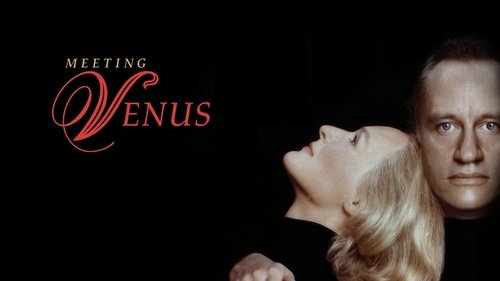Artivels
Undescribable Perfection
Grimerlana
Plenty to Like, Plenty to Dislike
SunnyHello
Nice effects though.
Stevecorp
Don't listen to the negative reviews
Claudio Carvalho
The Hungarian conductor Zoltan Szanto (Niels Arestrup) is invited to conduct Tannhäuser by Richard Wagner in Paris. Szanto has to face problems with the ego of the artists, strikes and his family since he falls in lover with the diva Karin Anderson (Glenn Close). But in the end, his love for Karin and passion for Wagner bring redemption to him.One movie that I regret that has not been released on DVD or Blu-Ray in Brazil is "Meeting Vênus", of 1991 from the critically acclaimed Hungarian director István Szabó and with Glenn Close in the top of her career in the role of a problematic diva.Using the staging of opera "Tannhäuser" by Richard Wagner in Paris as background, this wonderful feature is a satire of the unification of Europe that was happening in that historical moment through the ego of the musicians from different countries in the orchestra where the character of Glenn Close is the lead attraction.Just as information, Vênus is the mundane woman or goddess that the troubadour Tannhäuser has sex in the medieval legend that the opera is based.The mime of Glenn Close, dubbed by Kiri Te Kanawa, is perfect and the climax of this movie is the entrance of the artists singing Pilgrims Chant in the opera house and Szanto's stick blossoming. I have seen this scene several times on my VHS that I have seen at least four times. My vote is ten.Title (Brazil) : "Encontro com Vênus" ("Meeting Venus")
aberlour36
This film is advertised as a biting satire, a romantic comedy, and a display of glorious operatic music. In fact, it is an old fashioned soap opera about "putting on a show." Yes, the acting is good. And there are indeed some telling observations on the difficulties of trade unions and nationalistic strains in contemporary Europe. But there is very, very little comedy, even less satire, and even less opera. Mostly the film is about the romance between a neurotic and unfaithful conductor and his even more neurotic soprano. We are supposed to care if they have a prolonged affair. There are plenty of tears, shouting, and angst.In the end, the show is so incredibly wonderful (we get a few snippets of the music, just enough to infuriate all Wagnerites) that everyone hugs and kisses. End of film. In short, this is a lengthy waste of time. Unless, of course, you're into soap opera.
alvink
this movie, besides giving the casual viewer a glimpse into the operatic world, also affords the viewer a casual glimpse into the world and the business, of music making, and it ain't pretty. but it's accurate.as a professional musician in an international setting for more than 25 years, let me assure you that the evils of the music business are all here on display, and they are represented accurately: complaining musicians, managers for whom the word 'know' was replaced by the word 'no' at an early age (perhaps in their infancy), smarmy interfering union reps, and please God, save us all from short conductors with bleeping inferiority complexes.and then there are the operatic singers. oh my!! (dr. georg szell called opera singers, " 'unmusical beasts', who have to have every note beaten into them by a vocal coach". this is true, by my experience).the only really weak moment that i noticed was when the conductor left the podium during a rehearsal to knock on the door of the singer. this is absolutely improbable/impossible in my experience. conductors get their 'power' by being on the podium. they do not leave the podiumorchestra conducters get/force sex by more sordid means, not by leaving the podium.this movie has a lot to recommend it, on many different levels- check it out.i give it a 9.2.watch it in a 'Robert Altman' frame of mind, i think that you will see what i mean.it's not 'terror in tiny town'. and it's not, 'the godfather, part one'. it's somewhere in between. it's really a fine movie. thanks. alvink
joska kerekes
This film is much more than a customary movie about opera, though opera lovers get first-rate extracts from Wagner's Tannhauser as well. The action takes place in an imaginary "Opera Europe" in Paris. István Szabó, the excellent film director is really interested here in fanatic people of the theater who came from several countries of Europe to unite their talent in order to create a successful performance of Wagner's youthful masterpiece. The ensemble is a mixture of multinational people: the head of the company (a Spaniard, a former hero of the Spanish Civil War,) her private secretary and mistress (descendant of a noble Russian family,) the conductor (a talented young Hungarian who suffers from inferiority complex because of his East-block origin,) the singer who plays Tannhauser (a permanently offended dumpy man from the DDR with beautiful voice,) the French theatrical technician (a pig headed trade unionist who causes much trouble,) etc. They carry with themselves all good and vicious habits and traditions of their origin which cause many conflicts but humorous episodes as well during the rehearsals. There is a remarkable scene when at a dinner party the protagonists put aside all of their conflicts and sing together a song called "Suliko" which was once Stalin's favorite. (They sing it not because they love Stalin, but because of a certain nostalgia for their youth.) In the center of the story stands the Hungarian conductor's and a Nordic singer's (played by Glenn Close) stormy love affair which ends in diminuendo (using here deliberately this term of music.) Strongly recommended for everyone who loves art and theater.



